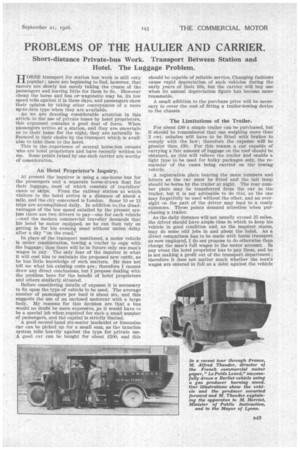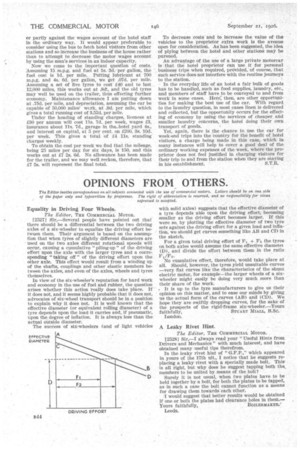PROBLEMS OF THE HAULIER AND CARRIER.
Page 61

Page 62

If you've noticed an error in this article please click here to report it so we can fix it.
Short-distance Private-bus Work. Transport Between Station and Hotel. The Luggage Problem.
HORSE transport for station bus work is still very popular; users are beginning to find, however, that motors are slowly but surely taking the cream of the passengers and leaving little for them to do. However cheap the horse and bus or -wagonette may be, its low speed tells against it in these days, and passengers show their opinion by taking other conveyances of a more up-to-date type when they are available.
As we are devoting considerable attention in this article to the use of private buses by hotel proprietors, this argument contains a good deal of force. When passengers arrive at a station, and they are -uncertain as to their home for the night; they are naturally iniluenc.ed in their choice' by the transport which is available to take them to the hotel.
This is the experience of several horse-bus owners who are hotel proprietors and have recently written to . me. Some points raised by one such carrier are worthy of consideration.
An 'Hotel Proprietor's Inquiry.
At present the inquirer is using a one-horse bus for the passengers and a separate horse-drawn float for their luggage,most of which consists of traVellers' cases or skips. From the railway station at which visitors to the hotel arrive is a distance of about a mile, and the city concerned is London. Some 10 or 12 trips are accomplished daily. In addition to the disadvantages of the low speed entailed by the present system there are two drivers to pay—one for each vehicle —and the modern commercial traveller demands that his hotel be motor equipped, as he can then rely on getting in for his evening meal without undue delay after a day "on the road," In place of the transport mentioned, a motor vehicle Is under consideration, towing a trailer to cope with the luggage ; thus there will be in future only one man's wages to pay. The only fear of the inquirer is what It will cost him to maintain the proposed new outfit, as he has little knowledge of such matters. He does not tell me what his existing costs are; therefore I cannot draw any direct conclusions, but I propose dealing with the problem here for the benefit of hotel proprietors and others similarly situated.
Before considering details of expense it is necessary to fix upon the type of vehicle to be used. The average number of passengers per load is about six, and this suggests the use of an enclosed motorcar with a large body. My reasons for this decision are that a bus would no doubt be more expensive, as it would have to be a special job when required for such a small number of passengers, and the capital is strictly limited.
good second-hand six-seater landaulet or limousine car can be picked up for a small sum, as the taxation system tells heavily against the type for private use. A good ear Can be bought for about £200, and this should be capable of reliable service. Changing fashions cause rapid depreciation of such vehicles during the early years of their life, but the carrier will buy one when its annual depreciation figure has become more reasonable.
A small addition to the purchase price will be necessary to cover the cost of fitting a trailer-towing device to the chassis.
The Limitations of the Trailer.
For about 130 a simple trailer can be purchased, but it should be remembered that one weighing more than 2 cwt. unladen will have to be fitted with brakes to comply with the law ; therefore the expense will be greater than ao. For this reason a car capable of carrying a fair amount of luggage_on the roof should be obtained, as this will relieve the trailer and enable a light type to be used for bulky packages only, the re-, mainder of the cases being carried on the towing vehicle.
_ A registration plate bearing the same numbers and letters as. the car must be fitted and the tail lamp should be borne by the trailer at night. The rear number plate may be transferred from the car to the trailer, but it is not advisable to do this, as the one may forgetfully be used without the other, and an oversight on the part of the driver may lead to a costly Summons. These points demand attention when purchasing a trailer.
As the daily distance will not usually exceed 25 miles, the driver should have ample time in which to keep his vehicle in good condition and, as the inquirer states, may do some odd jobs in and about the hotel. As a direct comparison has to be made with horse transport as now employed, I do not propose to do otherwise than charge the man's full wages to the motor account. In any event the hotel proprietor has to pay them, and he is not making a profit out of the transport department ; therefore it does not matter much whether the man's wages are entered in full as a debit against the vehicle or partly against the wages account of the hotel staff in the ordinary way. It would appear preferable to consider using the bus to fetch hotel visitors from other stations and so increase the business of the house rather than to attempt to decrease the motor wages account by using the man's services in an indoor capacity.
Now we come to the important question of costs. Assuming 15 m.p.g. and fuel at is. 3d. per gallon, the fuel. cost is 1d. per mile. Putting lubricant at 700 m.p.g. and 4s. ed. per gallon, we get .07d. per mile. Assuming a set of five tyres to cost £40 and to last 12,000 miles, this works out at .8(r., and the old tyres may well be used on the trailer, thus effecting further economy. Maintenance all-mance I am putting down at .75d. per mile, and tlepreciation, assuming the car be capable of 50,000 miles' wcrk, at .9d. per mile, which gives a total running cost of 3.52d. per Mile.
Under the heading of standing charges, licences at 130 per annum will cost us. 7d. per week, wages 13, insurance about 11s. 7d., garage in the–hotel yard 4s., and interest on capital, at 5 per cent. on £200, 35. 10d. per week. This gives a total of 14 Ils, standing charges weekly.
To obtain the cost per week we find that the mileage, being 25 miles per day for six days, Is 150, and this works out at £7 2s. 6d. No allowance has been made for the trailer, and we may well reckon, therefore, that 17 5s. will represent the final total. To decrease costs and to increase the value of the vehicles to the proprietor extra work_ is the avenue open for consideration. As has been Suggested, the idea of plying between the hotel and other stations may be pursued.
An advantage of the use of a large private motorcar Is that the hotel proprietor can use it for personal business trips when required, provided,' of course, that such service does not interfere with the routine journeys to the station.
In the everyday life of an hotel a fair bulk of goods has to be handled, such as food supplies, laundry, etc., and members of staff have to be conveyed to and from work in some cases. Here, then, are other opportunities for making the best use of the car. With regard to the laundry question, in most cases linen is delivered and collected, but the opportunity occurs for the effecting of economy by using the Services of cheaper and smaller laundry concerns, the hotel doing their own transport of goods.
Yet, again, there is the chance to use the car for week-end trips into the country for the benefit of hotel visitors, a charge being made in this case, which in many instances will help to cover a good deal of the ordinary working expenses of the week, where the proprietor does not feel justified in charging visitors for their trip to and from the station when they are staying in his establishment. S.T.R.




































































































